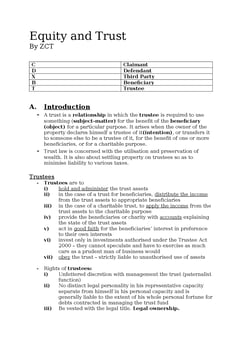Pennington v Waine [2003] Conv 192
Judgement for the case Pennington v Waine
Table Of Contents
KEY POINTS
-
The shares were not part of the donor's estate upon her death due to an equitable assignment of those shares.
This was the case even though the donor had not taken all necessary actions to formally transfer the shares.
The decision was based on the clear intent of the donor to immediately effect the transfer, and it would have been unjust for her to reverse her decision.
-
Therefore, the court held that the donor held the shares on a constructive trust for the nephew.
Citing Re Rose, it was established that equitable ownership could be transferred without the requirement of registration.
While completing the necessary forms and delivering them to the company was deemed sufficient, it should be noted that the act of delivering to the company was not an additional mandatory requirement.
What mattered was the intent for the transfer to take effect immediately.
FACTS
Prior to her death, Ada's husband, Leslie Crampton, owned 1,399 shares in the Company, while Ada owned 101 shares and the rest were owned by Harold Crampton, Sr. After Leslie's death, his shares were transferred to Ada. Ada expressed her intention to transfer 400 of her shares to her nephew, Harold. A share transfer form was prepared, signed by Ada, and returned to Mr. Pennington, a partner in the Company's auditors. However, the form was not processed before Ada's death.
Ada also wanted Harold to become a director of the company. Mr. Pennington sent Harold a form consenting to his directorship and informed him of Ada's intent to transfer 400 shares to him. Harold signed the form, and Ada countersigned it.
The Company's articles of association included pre-emption articles that required shares to be offered to members before being transferred to others. Ada's shares could not be transferred to Harold under these articles without complying with specific requirements, including offering the shares to other members at a fair value.
The Company's articles also mandated directors to hold one share in the Company, and Harold needed to obtain this share qualification by October 30, 1998, which could only be obtained from Ada. Ada's will made specific gifts of her shareholding but did not mention the 400 shares in question.
The main issue for the judge was whether the 400 shares formed part of Ada's residual estate or were held in trust for Harold. If they were effectively given to Harold, he would have a majority of 51% of the issued shares in the Company.
COMMENTARY
It was determined that despite the donor's failure to fulfill all necessary formalities, the shares were effectively assigned equitably. The crucial factor was the donor's clear and immediate intention to transfer ownership.
The court considered it unconscionable for the donor to retract her intent, especially since the nephew had acted to his detriment by assuming directorship based on the understanding of the impending transfer.
ORIGINAL ANALYSIS
The donor intended for her nephew to take up directorship in a private company. In order for him to do so, he needed to own shares in the company. Therefore, she executed a share transfer form concerning shares in the company in favour of her nephew.
In contravention of the companies act, she had not delivered the share transfer form to her nephew. Neither had he been registered as a shareholder.
The donor had sent the forms to her agent, the company auditor, who then told the nephew the he need not take further steps as regards the shares. The nephew then took up directorship of the company.
The court held that the shares did not from part of the donor’s estate on her death as there was an equitable assignment of those shares. This was so despite the fact that the donor had not done everything in her power to transfer the shares.
The court reached its decision partly on the basis that clearly the donor intended the transfer to have immediate effect and it would have been unconscionable for the donor to retract, so that the donor was considered to hold the shares on constructive trust for the nephew.
-
Unconscionability would depend on the circumstances in each particular case but in this case, the court felt that it was because the Donor had told the nephew of her intentions and he, in taking up directorship, had acted detrimentally.
What constitutes unconscionability?
Arden LJ
-
This approach, rather than the stricter approach of previous cases, will give effect to the overall intentions, i.e. that X property will be given to Y.
Yes, but this leaves the law uncertain as to when the courts will go against the established rules of when a trust arises.
RELATED CASES
For Further Study on Pennington v Waine
Need instant answers? Our AI exam tutor is here to help.
Ask questions 🙋 Get answers 📔 It's simple 👁️👄👁️
Our AI is educated by the highest scoring students across all subjects and schools. Join hundreds of your peers today.
Get StartedSimilar Cases
Related Product Samples
These product samples contain the same concepts we cover in this case.
| Trusts and Equity | Constitution Short Notes (7 pages) |
| Trusts and Equity | Formalities Constitution Of Trusts Incompletedly Constituted Trusts Notes (57 pages) |

